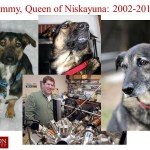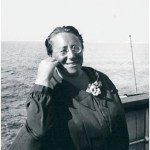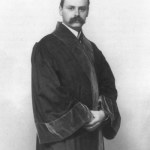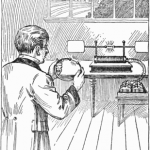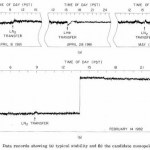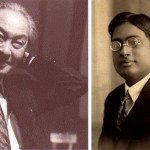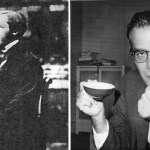Publicity
A few weeks ago, I traveled down to Jefferson Lab in southern Virginia to give a talk for their Science Series of public lectures. They recorded the talk, and have done a very nice job of editing together the video, which you can see at that link, or right here:
It's a bit under an hour, which must include the Q&A period at the end. So, if you've been wondering what sort of thing I do when I travel to give talks, well, here's an example. And it'll give you something to keep you entertained while I travel to Illinois to give another (different) talk tomorrow...
I've been remiss in my self-promotional duties, but I'm giving a public lecture tomorrow night in Newport News, VA, as part of the Jefferson Lab Science Series. This will be my traditional "What Every Dog Should Know About Quantum Physics" talk, with the sad addition of a slide honoring the late, great Queen of Niskayuna (visible as the "featured image" with this post). This isn't the first dog-physics talk I've given since her death in December, but the previous one was the relativity talk, which has less Emmy-specific content. This one includes one of the video clips I made around a dog…
I've been slacking in my obligation to use this blog for self-promotion, but every now and then I remember, so here are two recent things where I was interviewed by other people:
-- I spoke on the phone to a reporter from Popular Mechanics who was writing a story about "radionics" and "wishing boxes," a particular variety of pseudoscience sometimes justified with references to quantum mechanics. The resulting story is now up, and quotes me:
It is hard to investigate the ethereal thinking around radionics, but physics is something that can be parsed. So I got in touch with Chad Orzel, a…
I've been falling down on the job of informing you about promotional events for Eureka, mostly because the pace of these has slackened. But I'll be on the radio today, on WYPR's "Midday with Dan Rodricks" based in Baltimore (I'll be in the usual studio in Albany for this...). This is scheduled for a full hour, 1-2pm Eastern time.
So, if you're in Charm City, tune in. Or listen via the Internet from basically anywhere.
I keep forgetting to mention these, but I have two talks coming up:
1) Tonight, March 17, I'm talking about Eureka to the Mid-Hudson Astronomical Association on the campus of SUNY New Paltz. This is a version of the talk I gave in Bristol, UK over the summer, but with the soccer content replaced with American football.
2) Next Thursday, March 26, I'll be giving a Forman Lecture as part of the Vanderbilt University Physics Colloquium (following in Rhett's footsteps...). This is going to be a revised version of the social-media talk I've given in the past. I need to blow that up and put it back…
Kate's a big consumer of audio books, but I've never been able to listen to them. About five minutes in, I doze right off, every time. However, I know there are a lot of folks like Kate who love audio books and listen to them while commuting, so I'm very happy to announce that Audible is now selling an audio edition of Eureka.
This is the first of my books to get an audio edition, which is cool-- we actually sold audio rights to the first one, but I guess after they paid for it, they discovered that it has a whole bunch of pictures that are kind of integral to the book. At least, I'm guessing…
There's a new-ish book review podcast covering pop-science books, BookLab, hosted by Dan Falk and Amanda Gefter, and their latest episode includes my Eureka as the third of three books being discussed (a bit more than 40 minutes in, though their discussion of the other books is also interesting...).
It's sort of an odd experience listening to other people talking about my book; most of the audio I've heard about it is listening to my own interviews, where I'm actively participating (I recorded another radio interview yesterday; not sure when it will air, but I'll post a link). Happily, they…
(When I launched the Advent Calendar of Science Stories series back in December, I had a few things in mind, but wasn’t sure I’d get through 24 days. In the end, I had more than enough material, and in fact didn’t end up using a few of my original ideas. So I’ll do a few additional posts, on an occasional basis, to use up a bit more of the leftover bits from Eureka: Discovering Your Inner Scientist…)
While Eureka is built around stories, it's really a book about the process of science, using those stories to highlight particular aspects of the scientific process. The hope is that making the…
No, not the little cover .jpg that I use as the "featured image" to tag these posts promoting Eureka. The post title refers to the Big Picture Science radio show from the SETI insitute. I'm one of the people interviewed in the latest episode, Maria Konnikova (author of Mastermind) and Louis Liebenberg.
This is another interview that was recorded remotely down at WAMC in Albany. They pushed back on my stock answers a little more than usual, which in one sense was fun, but was also pretty exhausting, as I was at the lowest point of the cold I'm just getting over now. I went home right after it…
(When I launched the Advent Calendar of Science Stories series back in December, I had a few things in mind, but wasn’t sure I’d get through 24 days. In the end, I had more than enough material, and in fact didn’t end up using a few of my original ideas. So I’ll do a few additional posts, on an occasional basis, to use up a bit more of the leftover bits from Eureka: Discovering Your Inner Scientist…)
While we mostly think of science being done in comfortable institutes if not gleaming laboratories, one of the most impressive and inspiring things about science is that people can and do carry…
(When I launched the Advent Calendar of Science Stories series back in December, I had a few things in mind, but wasn't sure I'd get through 24 days. In the end, I had more than enough material, and in fact didn't end up using a few of my original ideas. So I'll do a few additional posts, on an occasional basis, to use up a bit more of the leftover bits from Eureka: Discovering Your Inner Scientist...)
One of the things I was reacting against in writing Eureka is the popular idea of scientists as a sort of unworldly elite, off doing their ivory-tower idealized thing without worrying about…
The ending of last night's Super Bowl couldn't've been more perfect as a demonstration of the point I was making about scientific thinking in football (and, you know, in that book I keep flogging...). First, on the positive side, you have New England's Malcolm Butler making the key play:
"I knew what was going to happen," said Butler, an undrafted free agent out of Western Alabama who said New England was the only team that gave him a chance to reach the NFL. "I don't know how I knew. I just knew. I just beat him to the point and caught the ball."
Perhaps Butler knew because he had seen the…
I wrote up another piece about football for the Conversation, this time drawing on material from Eureka, explaining how great football players are using scientific thinking:
Seattle Seahawks cornerback Richard Sherman gets called a lot of things. He calls himself the greatest cornerback in the NFL (and Seattle fans tend to agree). Sportswriters and some other players call him a loudmouth and a showboater. Fans of other teams call him a lot of things that shouldn’t see print (even on the internet). One thing you’re not likely to hear anyone on ESPN call Sherman, though, is “scientist.”
And…
While I've managed to generate a lot of blog traffic talking about football, I sort of suck at turning that into book sales. Sigh. I am, however, continuing to do interviews in support of Eureka: discovering Your Inner Scientist, the most recent of which is this one with WICN's Inquiry, hosted by Mark Lynch.
This covers a bunch of topics that haven't been talked about in other interviews, so if you're a completist, I recommend that. And if you're just here for the football talk, well, there's a bit of that, too, toward the end. I did have some trouble getting the audio to work properly in…
(When I launched the Advent Calendar of Science Stories series back in December, I had a few things in mind, but wasn't sure I'd get through 24 days. In the end, I had more than enough material, and in fact didn't end up using a few of my original ideas. So I'll do a few additional posts, on an occasional basis, to use up a bit more of the leftover bits from Eureka: Discovering Your Inner Scientist...)
One of the tricky things about writing this book was that I didn't just need stories from the history of science, but stories that fit a particular pattern. The point of the book, after all, is…
(When I launched the Advent Calendar of Science Stories series back in December, I had a few things in mind, but wasn't sure I'd get through 24 days. In the end, I had more than enough material, and in fact didn't end up using a few of my original ideas. So I'll do a few additional posts, on an occasional basis, to use up a bit more of the leftover bits from Eureka: Discovering Your Inner Scientist...)
Every physicist with the tiniest bit of a public profile gets letters from people with a pet theory to promote. These days, email and social media make it incredibly easy to flood the inbox of…
Two new items about Eureka: Discovering Your Inner Scientist:
1) WAMC has now posted the interview I did with Joe Donahue on The Roundtable. This was a fun interview, and covers a number of examples from the book, so I think gives you a really nice sense of what it's all about.
2) There's a review of Eureka in New Scientist, along with two other books. It's fun to see all these different publications do reviews, because every reviewer latches onto a different example to feature. You can almost deduce the entire contents of the book if you read all of the different reviews...
The New Scientist…
(When I launched the Advent Calendar of Science Stories series back in December, I had a few things in mind, but wasn't sure I'd get through 24 days. In the end, I had more than enough material, and in fact didn't end up using a few of my original ideas. So I'll do a few additional posts, on an occasional basis, to use up a bit more of the leftover bits from Eureka: Discovering Your Inner Scientist...)
One of my very favorite stories about a famous physicist concerns a young man of about 19, arriving at Cambridge from the University of Edinburgh. While being introduced around the college, it…
"Hey," you say, "It's been, like, a week and a half since you did a post flogging Eureka: Discovering Your Inner Scientist. What gives?" Well, I've been kind of busy, and also the media world sort of goes into suspended animation over the stretch between Christmas and New Year's.
However, there's publicity stuff in the works. Specifically, the interview I recorded with Joe Donahue for The Roundtable on WAMC will probably air today. I'm not sure exactly when-- the show runs from 9am to noon, but I would bet on some time between 10:20 and 11:45, because I'm teaching a class then.
Anyway, it's…
When I launched this back at the start of December, I honestly wasn't sure I would have enough good stories to make it through. I suspected I might end up going a week or two, then quietly letting the whole thing drop. As we come to the end, though, I've run out of days well before running out of stories. There's this one slot left, and a huge number of great stories I could relate-- Pauli proposing the neutrino as an act of desperation, or Cowan and Reines detecting it. The race to split the atom in the 1930's, won by Rutherford's Cavendish Lab. Julian Schwinger's odd work schedule. John…
